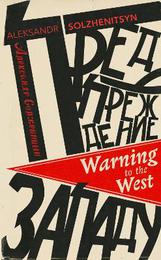
|
Warning to the West
Paperback / softback
Main Details
| Title |
Warning to the West
|
| Authors and Contributors |
By (author) Aleksandr Solzhenitsyn
|
| Physical Properties |
| Format:Paperback / softback | | Pages:144 | | Dimensions(mm): Height 178,Width 110 |
|
| Category/Genre | World history |
|---|
| ISBN/Barcode |
9781784875664
|
| Classifications | Dewey:320 |
|---|
| Audience | | General | | Tertiary Education (US: College) | | Professional & Vocational | |
|---|
|
Publishing Details |
| Publisher |
Vintage Publishing
|
| Imprint |
Vintage Classics
|
| Publication Date |
5 December 2019 |
| Publication Country |
United Kingdom
|
Description
Solzhenitsyn's polemical speeches - a primer for understanding the moral, political vision of the Nobel prize winner 'Can one part of humanity learn from the bitter experience of another or can it not? Is it possible or impossible to warn someone of danger...to assess soberly the worldwide menace that threatens to swallow the whole world? I was swallowed myself. I have been in the dragon's belly, in its red-hot innards. It was unable to digest me and threw me up. I have come to you as a witness to what it is like there, in the dragon's belly' During 1975 and 1976, Nobel Prize-winner Aleksandr Solzhenitsyn embarked on a series of speeches across America and Britain that would shock and scandalise both countries. His message- the West was veering towards moral and spiritual bankruptcy, and with it the world's one hope against tyranny and totalitarianism. From Solzhenitsyn's warnings about the allure of communism, to his rebuke that the West should not abandon its age-old concepts of 'good' and 'evil', the speeches collected in Warning to the West provide insight into Solzhenitsyn's uncompromising moral vision. Read today, their message remains as powerfully urgent as when Solzhenitsyn first delivered them.
Author Biography
Aleksandr Solzhenitsyn was born in 1918 and grew up in Rostov-on-Don. He graduated in Physics and Mathematics from Rostov University and studied literature by correspondence course at Moscow University. In World War II he fought as an artillery officer, attaining the rank of captain. In 1945, however, after making derogatory remarks about Stalin in a letter, he was arrested and summarily sentenced to eight years in forced labour camps, followed by internal exile. In 1957 he formally rehabilitated, and settled down to teaching and writing, in Ryazan and Moscow. The publication of One Day in the Life of Ivan Denisovich in Novy Mir in 1962 was followed by publication, in the West, of his novels Cancer Ward and The First Circle. In 1970 he was awarded the Nobel Prize for Literature, and in 1974 his citizenship was revoked and he was expelled from the Soviet Union. He settled in Vermont and worked on his great historical cycle The Red Wheel. In 1990, with the fall of Soviet Communism, his citizenship was restored and four years later he returned to settle in Russia. Aleksandr Solzhenitsyn died in August 2008.
ReviewsWhen we look back at the 20th century, Aleksandr Solzhenitsyn will be remembered not just as an influential author, but as one of the few authors who actually altered the way in which millions of people thought about politics... Solzhenitsyn stood out, even among an exceptional generation of Russian dissidents and writers, for his extraordinary commitment to truth-telling -- Anne Applebaum
|